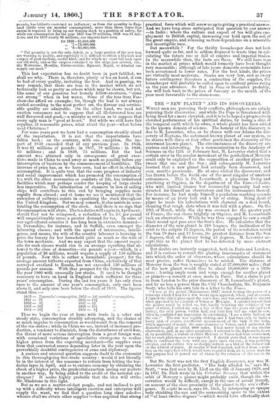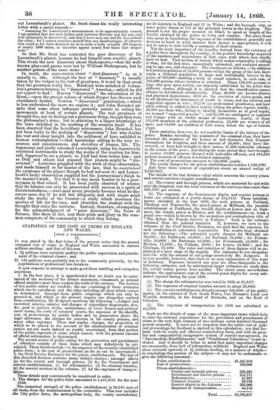THE "NEW PLANET" AND ITS DISCOVERERS.
WHILE men are pursuing their conflicts, philosophers are calmly pursuing their discoveries; and while the Pope is threatened with
being freed for a more elevated, and it is to be hoped a progressively elevated performance of his spiritual duties, by losing a slice of the temporal earth which he owns, a whole planet has been added to the known domain of science. The honour of this discovery is due to M. Leverrier, who, as he shares with our Adams the dis- covery of Neptune, the outermost known planet of our system, so he shares with three or four other gentlemen the discovery of the innermost known planet. The circumstances of the discovery are curious and interesting. In a communication to the Academy of Sciences on the 12th of February last, M. Leverrier stated that a certain error in the secular movement of the perihelion of Mercury could only be explained on the supposition of another planet be- tween that one and the Sun ; and subsequently M. Leverrier learned that a new planet had actually been discovered, and seen months previously. He at once visited the discoverer, and has drawn before the world one of the most singular of amateur astronomers. This is Dr. Lescarbault, a physician living and practising at Orgeres, in the department of the Eure-et-Loire, who with limited finance but resourceful ingenuity had con- structed for himself an observatory and the instruments thereof. For instance, he had made himself a pendulum marking seconds by means of an ivory ball and a bit of string. Being short of paper he made his calculations with charcoal on a deal board, cleaning that rough slate when it was full with a plane. On the 26th of March, while the sky was overcast for the greater part of France, the sun shone brightly on Orgeres, and M. Lescarbatilt took an observation. While he was thus engaged he saw a small black round spot pass over the Sun's disc. He calculates that the diameter of the new planet is 310 leagues, the inclination of its orbit to the ecliptic 12 degrees, the period of its revolution round the Sun 19 days and 17 hours, its greatest distance from the Sun 7 degrees, that of Mercury being 25 degrees. M. Leverrier ac- cepts this as the planet that he has detected by more abstract calculations.
But doubts are instantly suggested, both in Paris and London ; and it is curious to remark the glaring inaccuracies of statement into which the order of observers, whose calculations should be most precise, suffer themselves to be misled. The distance of Mercury from the Sun is roughly stated at 37,000,000 miles ; that of the new planet would thus be about 10,000,000 or a little more ; leaving ample room and verge enough for another planet or planets—a remark at once made in Paris. But a claim is put
in from London to the prior discovery of M. Lescarbault's planet, and by no less a person than the City Chamberlain, Mr. Benjamin Scott, who tells his own tale in a letter to the Times. "I was at the period [Midsummer, 1847] stated testing the power cf a telescope which I had for a few weeks upon approval, when, just at sunset,
I turned the object glass upon the sun's disc, and was astonished to observe what appeared to be a transit of Venus or Mercury. I satisfied myself that the glasses could be relied on, but, hardly believing the evidence of my sense of vision, I called my son, a boy at that time five years old (and now
living), the only person within hail, and bade him tell me what he saw, when he confirmed my impression by exclaiming, 'I see a little balloon on
the sun V The sun was rapidly sinking, and I had time only to make a hasty and, of course, insufficient measurement of the bulk of the body, which appeared of nearly the same diameter as Venus, and I estimated its diameter roughly at about 4000 miles. I had never heard of any similar observation, and, in my utter perplexity, I referred to the Ephemeris, to see if, by possibility, a transit of either Mercury or Venus had been overlooked, but no such phenomenon was expected. I should state that it was impos- sible to confound the body with any spots upon the sun ; it was perfectly circular, and its outline was as sharply defined as a blot of the darkest on on the whitest of paper. At sunrise it had departed, and that from a posi- tion on the sun's face which would have required from six to seven days for that purpose had it passed out of vision by the rotation of the sun on its axis."
But Mr. Scott was not the first English discoverer, nor was M. Leverrier the first predictor. "The body alluded to," says Mr. Scott, "was first seen by M. Llofl on the 6th of January 1818, and in 1837 Dr. Dick wrote in his Celestial Scenery that within the orbit of Mercury a planet might probably exist, though the ob- servation would be difficult, except in the case of actual transit, on account of the close proximity of the planet to the sun's efful- gence. It might be seen, says Dr. Dick, by interposing an opaque body shielding the sun and the surrounding space to the extent of "at least twelve degrees "—which would have effectually shut
out Lesearbault's planet. Mr. Scott closes his really interesting letter with a naïve remark-
" Assuming Dr. Lescarbault's measurement to be approximately correct,
I am satisfied that two such bodies exist between Mercury and the sun (and will ultimately be discovered), and that I have seen one and Dr. Lesearbault the other ; for I cannot convince myself that any disadvantages of observa- tion could so far have deceived me as to make a body actually 310 leagues, or nearly 1000 miles, in diameter appear nearly four times that magni- tude."
So that Mr. Scott has contested the poor discovery of Dr. Lesearbault's planet, because he had himself seen another planet. This rivals the new discovery about Shakespeare,—that the well- known plays and poems were not by William Shakespeare, but by another person of the same name! In truth, the contestation about "first discovery." is, as it usually is, idle. Although the fact of " discovery " is usually taken by the vulgar as the test of greatness, it is not in that event that the greatness really lies. Mankind were satisfied of Colum- bus's greatness because he " discovered " America,—which he did not expect to find ! Harvey "discovered" the circulation of the blood,—upon the precise nature of which Draper has thrown such elncidatory doubts. Newton " discovered " gravitation,—which is less understood the more we explore it ; and John Herschel ad- mits that some other influence probably assists in ruling the movements at least of certain planets. The real greatness of thought lies, not in finding out a particular thing, though that were the philosopher's stone, but in attaining to a larger knowledge of the laws unfolded in the working of the creation itself. It has been observed that the hereditary astronomer, John Herschel, has not been lucky in the making of "discoveries "; but who doubts his vast and clear insight into the sublimest of laws unfolded to human contemplation ?—that knowledge adding to the very re- sources and consciousness, and elevation of human life. The ingenuous and justly esteemed Lesearbault, using his ingeniously contrived instruments to study the works of the creation for him- self, happened to see a planet, as Lloii had done before him ; and as Dick and others had guessed that planets might be "dis- covered." Leverrier grappled with the work of close observation, and made himself so far master of the law, that he ascertained the existence of the planet though he had not seen it; and Lesear- baules lucky observation supplied but the journeyman's finish to the master's work. Not that it is any mean honour to be a jour- neyman in that school. It has been justly observed of science that its labours can only be prosecuted with success in a spirit of disinterestedness,—since man never precisely foresees what he dis- covers some day if he will but diligently and with single mind. study the works of the Creator—a study which increases the 'sources of life for the race, and identifies the student with the thought that rules the universe. Instead, therefore, of competing for the acknowledgment of "prior discovery," the Peers of /Science, like those of Art, rest their pride and glory in the com- mon conquests of the community to which they belong.



























 Previous page
Previous page